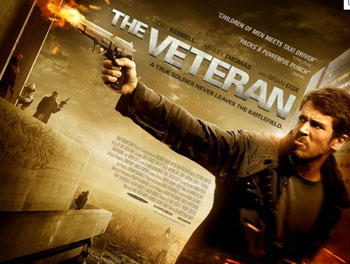The Veteran ***
 What strikes an instant chord with The Vanguard writer/director Matthew Hope’s The Veteran are real-life newspaper reports of servicemen and women returning from tours of duty and finding a lack of support for civvy life. Then there are the proposed defence cuts in a time when conflicts aboard seem to be escalating. It’s hard not to get emotional or political. But Hope manages to avoid banging the politics drum by concentrating on the ‘survival’ tactics of one lone soldier throughout.
What strikes an instant chord with The Vanguard writer/director Matthew Hope’s The Veteran are real-life newspaper reports of servicemen and women returning from tours of duty and finding a lack of support for civvy life. Then there are the proposed defence cuts in a time when conflicts aboard seem to be escalating. It’s hard not to get emotional or political. But Hope manages to avoid banging the politics drum by concentrating on the ‘survival’ tactics of one lone soldier throughout.
Think Harry Brown with bite: The Veteran follows paratrooper Miller (played by Toby Kebbell) who returns from Afghanistan to his crime-riddled London estate, where he must deal with his own nightmares and adjust to life back home on his own. Through a lack of work and possessing a particular, attractive skill set to a minority, he stumbles into a conspiracy involving his comrade-in-arms, the intelligent services and a gang of local drug dealers, and finds himself fighting an altogether different kind of war.
On the whole, Hope has produced a thought-provoking and truly distressing film about one lost soul’s relentless existence without any apparent hope of fitting back into ‘normal’ life. Sadly, Miller is yet another example of a faceless pawn in the defence game regardless of what his former bravery and actions achieved in a far-away land. However, there are some fanciful scenarios that simply fan the inner-city gang-culture bravado, as well as sillier ones when Miller meets corrupt agents in darkened car parks or derelict buildings. But once you get past the film’s brutal and extreme violence that some will question as controversial – one such fight with a baddie on a boat does shock but serves to portray Miller’s hand-to-hand combat experience, The Veteran does attempt to depict parallels between the worlds-apart war zones of Afghanistan and London. The former we never see, but are suggested by a brief but defining orange sunset scene, where Miller looks out over London’s skyline as a haunting battle soundtrack plays. There’s also a lengthy, energetic video-gaming-styled end shootout that’s quite alarming and makes you question – as in Harry Brown – where the hell the law is while all this is kicking off?
At the heart of The Veteran is the human story of an ex-para shut down to his feelings – a real victim of war. It sees Kebbell in an unfamiliar, deadpan stance, but with that distant glint of madness in the eye that we were first exposed to in RocknRolla. It’s undoubtedly a great performance from Kebbell who defines an exciting and serious character-acting chapter in this stage of his career, and shows why he was a 2009 BAFTA Rising Star nominee. However, even though the actor is making waves in Hollywood with Prince of Persia: The Sands of Time and The Sorcerer’s Apprentice, this probably still won’t grab studios’ attention, not because of its Brit slant on the subject matter as this has global resonance, but because parts of the story do not match up to Kebbell’s performance and feel like a made-for-Brit-TV feature-length drama, rather than a feature film.
Even though Hope wrote this with ex-SAS soldier Robert Henry Craft in an attempt to raise awareness of the effects of PTSD (Post-traumatic Stress Disorder), this is not so clear, paling into lesser significance to the more ‘exciting’ terrorism aspects. This is a shame as it’s the domestic, post-combat angle that’s the most compelling – we never really get that sense of inner conflict, however well acted by Kebbell. The film does tackle how the war on terror is fractured, ever evolving, and more closer to home, but trying to deal with too many issues at once, and giving too many tangent sub-plots detracts from the film-makers’ initial purpose.
Overall, there is a market for The Veteran in today’s events, and Hope’s effort will not go unnoticed, what with the commendable appearance of Adulthood’s Ashley Bashy Thomas as head gangster, Tyrone Jones, performing opposite Kebbell, and demonstrating some more of the best of Brit talent. The Veteran makes an accurate point about the links between home-grown and wider-scale conflicts, but it does appear to miss out on the film-makers’ psychological intention, in favour of whipping up the fear of terrorism, espionage, and going all gun-ho. In so doing, it’s lost its key message of helping us understand how ex-vets need to re-acclimatise, which is a great shame.
3/5 stars
By @FilmGazer